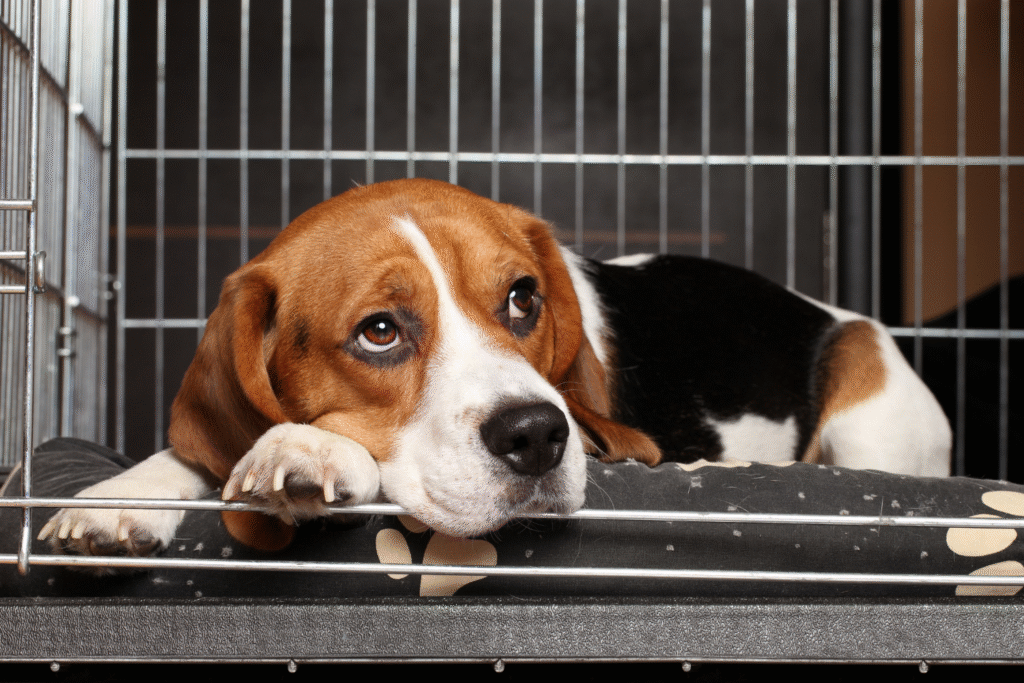A major win for animal welfare in the Midwest.

For years, Wisconsin’s beagle breeding farms quietly supplied puppies to research laboratories across the United States. That long-standing practice has finally come to an end. A new state ruling and settlement have officially banned the sale of beagle puppies for lab research, marking a huge victory for animal welfare advocates. The decision follows years of public outcry, undercover investigations, and legal battles. It signals a shift in how the state views animals bred for science—and could reshape research practices across the country.
1. Wisconsin officially ends puppy sales to laboratories.

In October 2025, Wisconsin regulators revoked the special permission that allowed local breeders to sell beagle puppies to research labs, as reported by FOX6 News. This change closed a loophole that had existed for decades. Under the new rule, puppies can no longer be separated from their mothers early or shipped for experiments. For many advocates, this is more than a legal adjustment—it’s the end of an era where companion dogs were treated as laboratory supplies rather than living beings.
2. The state’s largest breeder will shut down sales by 2026.

Ridglan Farms, a massive Dane County beagle breeder, agreed to stop selling dogs for research by July 2026, as stated by Spectrum News. The company had been one of the last large-scale suppliers of lab beagles in the nation. After years of protests and lawsuits, it surrendered its operating license and began phasing out puppy sales. While it can still conduct limited veterinary studies, mass exports to labs are over. The decision marks a rare moment where public pressure reshaped a powerful industry.
3. Animal advocates credit years of investigations for the victory.

Groups like the Beagle Freedom Project and PETA have spent years exposing poor conditions and pushing for change, as discovered by PETA. Their reports, including hidden-camera footage and inspection records, showed cramped cages and breeding dogs living in isolation. These revelations fueled outrage, leading to hearings, policy proposals, and finally, the ban. It’s a reminder that consistent advocacy—even against entrenched systems—can lead to reform that once seemed out of reach.
4. The new rule closes a long-standing legal loophole.

Before this change, research breeders could sell puppies under seven weeks old to labs, bypassing age limits meant to protect young animals. By revoking that exemption, the state now requires all dog breeders to follow the same standards. This ensures puppies stay with their mothers longer, improving health and socialization. It’s a small technical fix with major emotional weight for those who’ve fought to give these animals a better start in life.
5. The research industry faces new sourcing challenges.

With Wisconsin stepping back, labs that once depended on local beagle breeders will need new options. Some may turn to other states or consider using non-animal research models. The supply gap could accelerate a shift toward more ethical alternatives such as organ-on-a-chip technology and computer-based testing. While labs adapt, the hope is that fewer animals will be bred and confined purely for testing.
6. The agreement still allows limited in-house research use.

Under the settlement, Ridglan Farms can continue breeding dogs for internal veterinary work, but not for sale. It’s a compromise that acknowledges scientific needs while restricting mass production. For animal welfare groups, it’s progress, not perfection—but one that sets a new ethical standard. The focus now moves toward improving welfare for any dogs still involved in research, ensuring their use is transparent and humane.
7. Enforcement will determine how lasting the change becomes.

Passing the rule is one thing; enforcing it is another. The Wisconsin Department of Agriculture must ensure no breeder sidesteps the ban. Regular inspections and penalties will be essential to prevent backdoor sales. Advocates warn that without oversight, the system could quietly revert. The real success of this reform depends on how seriously the state monitors and maintains compliance over time.
8. Former lab dogs could now find new homes.

With fewer puppies being sent to labs, attention is turning to rehoming adult dogs retired from research. Rescue groups in Wisconsin are already coordinating adoption programs. These beagles—once destined for sterile enclosures—may finally know life in a backyard or family home. The ban has sparked a wave of optimism that these animals will not just survive, but finally live.
9. The move could inspire national reform efforts.

Wisconsin’s decision has drawn attention from lawmakers in other states. Advocates hope it sets a precedent that encourages broader limits on animal testing and breeding for research. If similar measures spread, large-scale lab breeding operations could disappear altogether, replaced by ethical research models and rehoming programs.
10. A shift in values may reshape science itself.

Beyond policy, this ban signals a moral turning point. For years, animals were seen as necessary tools of discovery. Now, public opinion and science are aligning toward compassion and innovation. Wisconsin’s new rule isn’t just a ban—it’s a reflection of changing human values, where empathy and progress are finally beginning to coexist.
